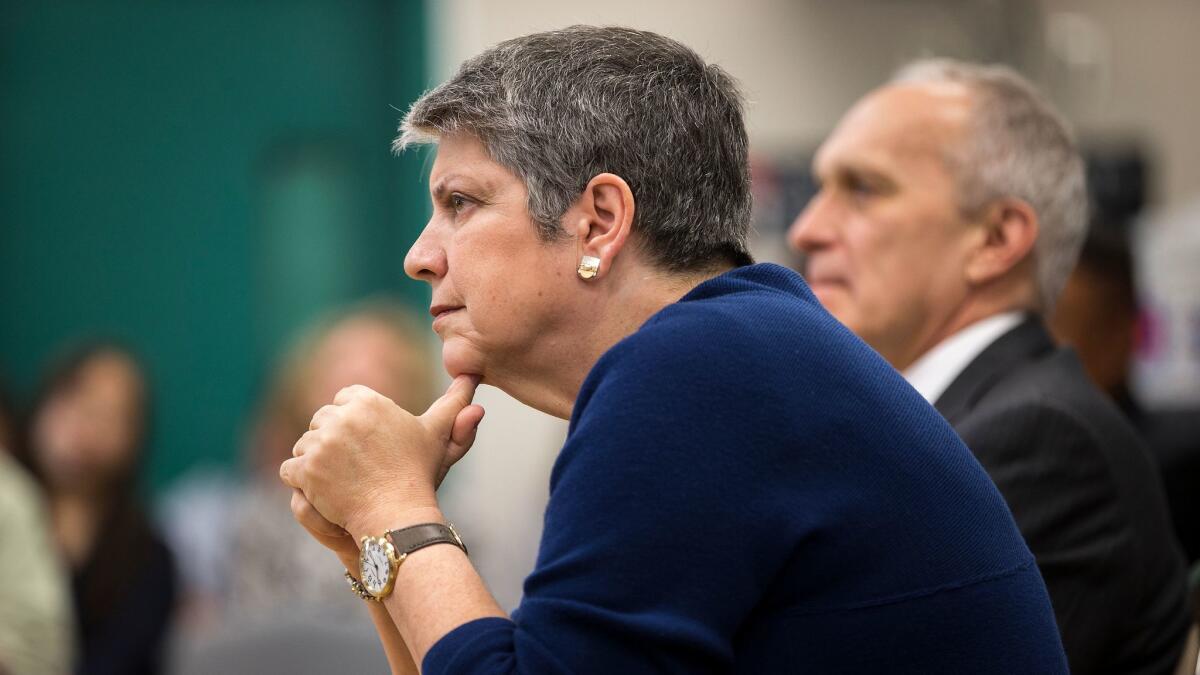Column: How the University of California exploited a visa loophole to move tech jobs to India

Using a visa loophole to fire well-paid U.S. information technology workers and replace them with low-paid immigrants from India is despicable enough when itâs done by profit-making companies such as Southern California Edison and Walt Disney Co.
But the latest employer to try this stunt sets a new mark in what might be termed âjob laundering.â Itâs the University of California. Experts in the abuse of so-called H-1B visas say UC is the first public university to send the jobs of American IT staff offshore. Thatâs not a distinction UC should wear proudly.
UC is training software engineers at the same time theyâre outsourcing their own software engineers. What message are they sending their own students?
— Rep. Zoe Lofgren (D-San Jose)
UC San Francisco, the systemâs biggest medical center, announced in July that it would lay off 49 career IT staffers and eliminate 48 other IT jobs that were vacant or filled by contract employees. The workers are to be gone as of Feb. 28. In the meantime theyâve been ordered to train their own replacements, who are employees of the Indian outsourcing firm HCL Technologies.
The training process was described by UCSF managers by the Orwellian term âknowledge transfer,â according to Audrey Hatten-Milholin, 53, an IT architect with 17 years of experience at UCSF who will be laid off next month.
âThe argument for Disney or Edison is that its executives are driven to maximize profits,â says Ron Hira of Howard University, a expert in H-1B visas. âBut UC is a public institution, not driven by profit. Itâs qualitatively different from other employers.â
By sending IT jobs abroad, UC is undermining its own mission, which includes preparing California students to serve the high-tech industry.
âUC is training software engineers at the same time theyâre outsourcing their own software engineers,â says Rep. Zoe Lofgren (D-San Jose), whose district includes much of Silicon Valley. âWhat message are they sending their own students?â
As weâve reported before, H-1B visas were created to allow American technology companies to import uniquely talented individuals from abroad; visa holders can work in the U.S. for three years, with the goal of obtaining permanent residency and ultimately citizenship.
But the program has been co-opted by outsourcing firms that use the visas to import workers, mostly from India, to replace Americans in middle-level IT jobs. Those firms, including HCL, corral about half of all H-1B visas every year. The workers they import often live here barracks-style and are at the beck and call of supervisors who can revoke their residency at will. Eventually they return home to continue their assignments, without workplace benefits and at wages a fraction of what their American counterparts were paid.
UCSF officials say the decision to outsource 97 IT jobs, about 20% to the total IT headcount, was forced on it by daunting economic challenges. The state requires UCSF Health, which encompasses the universityâs hospitals, to be fiscally self-sustaining, collecting its revenue entirely from patient fees, Chief Executive Mark R. Laret says.
The hospitals recorded a $42-million deficit in the last fiscal year on $3.4 billion in revenue, he told me. The red ink was partially the result of an increased caseload from Medi-Cal, the stateâs Medicaid program, which was expanded under the Affordable Care Act. Medi-Cal reimbursements are so low that UCSF loses 40 cents on every dollar it spends on those patientsâ treatment, he says.
In searching for costs to cut, USCF concluded that the most expendable IT employees were systems maintenance staff, whose jobs could be done for so much less by foreign workers going without high salaries and fringe benefits.
UCSF officials have convinced themselves that most of the laid-off workers will have little trouble finding new jobs in the vibrant Bay Area technology industry; they say three of the workers already have accepted other positions at UCSF and some have been offered work by HCL. âThese individuals are not unemployable,â Laret says.
The university says outsourcing their work to HCL will save $30 million over the five-year term of the HCL contract, which will cost $50 million.
Thatâs a meager savings of 0.1% of the UCSF budget, which was $5.83 billion in 2015-16. But the key question is what the university may be giving up in terms of system security and other important considerations.
The work being sent abroad isnât trivial. According to an email sent to the IT staff last July, it includes managing and backing up most of the systemâs data; management and administration of its data networks; operations related to its telephones, email and video conferencing; and payroll and financial applications.
Laret says UCSF expects the security of all these systems to be at least as good under HCL as it is now, though he acknowledges that âthere are no guarantees.â Breaches of medical systems can be exceptionally harmful; a hack attack of UCLA Health Systemâs network revealed in 2015 may have compromised personal and medical information of 4.5 million patients.
Some UCSF workers involved in training their replacements were less than impressed with the process. Kurt Ho, 57, a systems administrator at UCSF since 2015 who is earning about $100,000, says he spent all of two days with his replacement. âHe told me he would go back to India and train his team, and would be sending me emails with questions.â
Hatten-Milholin, whose salary has been $127,000, says some of the replacements were on hand for two weeks.
âWhat was shocking is that the system is so complex thereâs no way you can learn it in two weeks,â she told me. She and Ho are among nine workers who have filed a complaint against UCSF with the state Department of Fair Employment and Housing, asserting that theyâve been discriminated against based on national origin, age, sex or race.
Disclosure of the layoffs triggered an uproar last fall. Letters went out to UC President Janet Napolitano from House Minority Leader Nancy Pelosi (D-San Francisco) and Lofgren, who urged Napolitano to reverse the outsourcing plan and suspend the HCL contract until UC can âthoroughly examineâ the public policy issues raised by the plan.
Sen. Dianne Feinstein (D-Calif.) pointedly reminded Napolitano that UC received about $8.5 billion in federal funding in 2014-15, and said she was unhappy to hear that the funds would be used âto replace Californian IT workers with foreign workers or labor performed abroad.â She added, âthis is not the wayâ to cut costs.
UCSF responded by tinkering with the plan a bit. The university told Feinsteinâs office in November that of 27 HCL employees assigned to UCSF during the transition, eight were H-1B visa holders. UCSF said all had been moved to other locations in the U.S. and would not be working any further on the UCSF program, which raises the question of why they were brought to UCSF for training in the first place.
Sending them away allowed UCSF to assert in a public statement that neither the university nor HCL would âreplace the affected UCSF employees ⌠with H-1B visa holders.â
But thatâs mostly an optical illusion, says Sara Blackwell, a visa attorney who has sued Disney for discrimination on behalf of Walt Disney World employees whose jobs were outsourced to an Indian H-1B firm.
âThe endgame is not to have foreign workers stay on the job here,â she says, âbut to move the jobs to India.â
Blame for the outsourcing extends well beyond UCSF. The California Legislature has systematically reduced to pennies the stateâs share of the budgets of UCSF and the rest of UC, which once was proudly supported by Sacramento. Meanwhile, Congress has consistently failed to close a glaring loophole allowing U.S. employers to send good American jobs overseas â instead, it has moved to expand the H1-B program at the behest of tech firms claiming, dubiously, that they canât find enough good engineers in the U.S.
UC President Janet Napolitano seems to be trying to dodge responsibility for this policy. Although she vowed to crack down on H-1B abuses as secretary of Homeland Security, a job she held from 2009 to 2013, sheâs been utterly silent about UCâs abuse of that very program on her watch.
Letâs be clear: The outsourcing of IT jobs to India isnât UCSF policy, but emerging UC policy. Napolitanoâs staff says this is UCSFâs deal. But the HCL contract on which UCSF is operating applies system-wide, and itâs up to individual campuses and schools to opt in; UCSF simply was the first to do so. According to notes from an Aug. 5 meeting of UCâs IT Architecture Committee, chief information officers at other campuses are happy to let UCSF act as a guinea pig and will âwait for a year before jumping in with HCLâ in order to gauge UCSFâs experience.
Of course, if UCSFâs initiative blows up in its face, the victims will be its patients, doctors and researchers. In running a university hospital, Laret told me, âyou have to make some hard choices.â Thatâs indisputable, but the unanswered question is whether UCSFâs choice will cost more than it saves.
Keep up to date with Michael Hiltzik. Follow @hiltzikm on Twitter, see his Facebook page or email [email protected].
Return to Michael Hiltzikâs blog.
ALSO
Republicans call Obamacare a âfailure.â These 7 charts show they couldnât be more wrong
Itâs not just politics: 2016 was an epidemic year for fake news in science, too
Happy New Year, porno-trolls: Youâve been indicted for fraud







